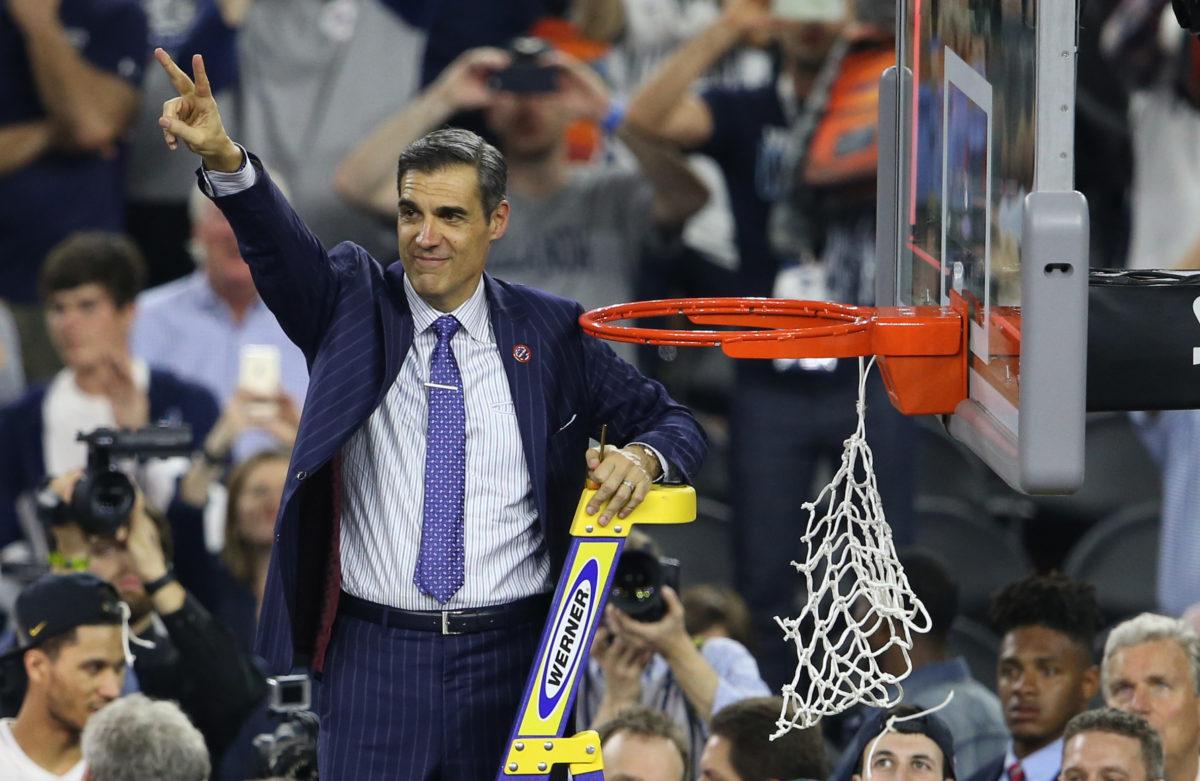Villanova is the top-rated team in the country according to the Division I men’s basketball committee, which revealed a bracket of the best 16 teams this afternoon on CBS. In the unprecedented unveiling, committee chair Mark Hollis, the director of athletics at Michigan State University, said the defending champion Wildcats were selected as the overall No. 1 seed if the tournament were to start today.
Villanova was seeded in a loaded East bracket along with No. 2 Louisville, No. 3 Kentucky and No. 4 UCLA. The East Regional is at Madison Square Garden March 24-26.
“Villanova played a challenging non-conference schedule and has achieved considerable success against several quality opponents on the road and on neutral-courts. Their consistency throughout the season gave them slight separation from other candidates for the overall top seed,” said Hollis.
Using a new policy adopted last summer, the committee asked Villanova for their preferred regional location, and the Wildcats selected the East regional in New York City. The other No. 1 seeds were assigned to regional sites using geographic proximity from their campuses. Kansas, the second-ranked team on the overall seed list, was sent to the Midwest regional in Kansas City, while fellow Big 12 Conference member Baylor is the top seed in the South regional in Memphis. The fourth No. 1 seed, unbeaten Gonzaga, was assigned to the West regional in San Jose.
“Those four teams are having tremendous seasons but as we know in college basketball, things can change quickly,” said Hollis. “There are more than 1,300 games left before Selection Sunday so how these teams are seeded and where they will ultimately be sent to play in the tournament remains a mystery.”
The four No. 2 seeds were North Carolina, which was assigned to the South regional; Florida State, which was sent to the Midwest; Louisville, which was placed in the East; and Oregon, which was sent West.
North Carolina is closer to New York City, but the committee assigned them to Memphis to avoid the top No. 2 team being in the same region as the overall No. 1 seed, per the committee’s bracketing principles.
The next four teams on the seed list were Arizona, Virginia and Southeastern Conference foes Florida and Kentucky. The closest regional for Arizona is San Jose but the Wildcats could not be sent there because their fellow Pac-12 Conference member Oregon is in that region. The bracketing principles dictate the committee separate the top four teams from the same conference when they are placed among the top 16 teams on the overall seed list. Therefore, Arizona was sent to the next closest site, which was Kansas City. Using the same bracketing principle, Virginia was blocked from going to the East and South, leaving the West regional as the only possible landing spot for the Cavaliers. Florida was assigned to its closest remaining regional site, which was Memphis, leaving the final No. 3 seed, Kentucky, to play in New York City.
The final quartet of teams were Butler, West Virginia, UCLA and Duke. As the highest-seeded No. 4 team, Butler was assigned to its closest region, which is Memphis. Without any Big 12 schools in the East region, West Virginia was eligible to go to New York City. However, Oregon’s placement in San Jose and Arizona’s assignment in Kansas City meant UCLA was blocked from those two regions. That forced the committee to move West Virginia to the West regional and send UCLA to the East regional.
Duke, which slid into the 16th spot by virtue of its win over North Carolina Thursday night, was sent to Kansas City. Duke was the fifth team from the Atlantic Coast Conference on the first four lines, which permitted the Blue Devils to be in the same region as Florida State. A matchup between those conference foes would not take place until the regional final.
“While the committee has conducted this orientation meeting for several years, the new element of publicly releasing our top 16 teams significantly added to the discussions this week,” said Hollis. “If nothing else, this week’s meeting will help us prepare for the next month, perhaps more so than before. We had terrific conversations about these 16 teams, plus others such as Cincinnati, Creighton, Purdue and Wisconsin, who were on the verge of being a first quadrant team. This was a productive and useful exercise, but now the committee can get back to the work we started November 11 and continue evaluating all possible tournament teams.”
Hollis is joined on the committee by vice chair Bruce Rasmussen, the director of athletics at Creighton University; Mitch Barnhart, the director of athletics at the University of Kentucky; Janet Cone, the director of athletics at the University of North Carolina Asheville; Tom Holmoe, the director of athletics at Brigham Young






